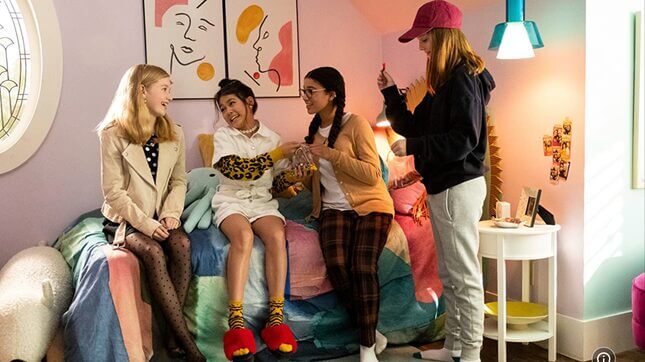

Growing up in the ’90s, my reading diet in grade school included a hearty portion of Ann M. Martin’s The Baby-Sitters Club series. Before Sex and the City offered Carrie, Samantha, Charlotte, and Miranda as archetypes upon which groups of women could project themselves, Kristy, Dawn, Mary Anne, Claudia, and Stacey came first. Nostalgia is a heavy drug, though, and revisiting any treasured text from childhood that’s been updated for modern times is often a recipe for disappointment. In the case of The Baby-sitters Club, a new Netflix reboot of the beloved classics, it’s okay to feel disappointed with the results, because part of growing up means recognizing when something is simply no longer for you.
The new iteration of The Baby-Sitters Club is updated for modern times, but the bones of what made the series so beloved remain intact. The origin story is as follows: Kristy Thomas (Sophie Grace), an intrepid and entrepreneurial 11-year-old, recognizes that there is a childcare issue in the idyllic town of Stoneybrook, Connecticut. Seeing her mother Liz (Alicia Silverstone) struggle to find a sitter lights a spark within, and so the idea for the Baby-Sitters Club is born. The remaining cast of characters is as you might remember them. Mary Anne Spiers (Malia Baker) is still shy, bookish, and babied by her strict father. Claudia Kishi (Momona Tamada) is an artist who still hides candy in various corners of her room. Stacey McGill (Shay Rudolph) the glamorous, New York City newcomer, still has diabetes and is good at math. Dawn Schaefer(Xochitl Gomez), is still Californian, not blonde, but retains the same space cadet charm without being a ditz. Kristy is much more abrasive in the show’s first episodes than I remembered her from the books, but otherwise, the characters’ spirits remain unchanged.
-

-

-

-

-

-

-

-

-

-

-

-

-

-

-

-

-

-

-

-

-

-

-

-

-

-

-

-

-

-

-

-

-

-

-

-

-

-

-

-








































